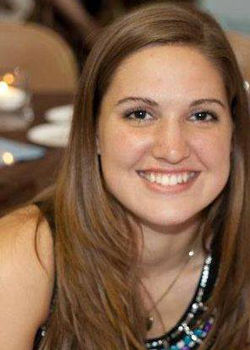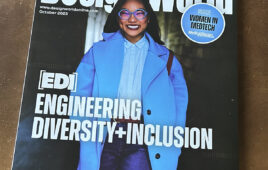Lauren Wickert
Head of Quality
Vesco Medical, Columbus, OH
 For Lauren Wickert, the path to engineering came through medicine. Her grandfather had a leg amputated around the time she was in high school. After the operation he received a prosthetic leg. “The mobility and freedom it gave him was amazing and that fascination with the human body and the medical innovations that restore quality of life, gave me the desire to become a biomedical engineer.”
For Lauren Wickert, the path to engineering came through medicine. Her grandfather had a leg amputated around the time she was in high school. After the operation he received a prosthetic leg. “The mobility and freedom it gave him was amazing and that fascination with the human body and the medical innovations that restore quality of life, gave me the desire to become a biomedical engineer.”
Wickert graduated from The University of Akron in 2015 with a BS in Biomedical Engineering and a focus in Biomechanics. Prior to graduation, she was an intern as a systems engineer at ABB Inc. in Wickliffe, OH. Then, she worked for ABB as a full-time contractor in systems engineering, Zimmer Biomet, Inc., then as a design engineer in Warsaw, IN on their global knee team. Now she is head of quality for Vesco Medical in Columbus, OH.
During her career, she gained experience assessing the design and effectiveness of medical devices and systems, especially as they relate to orthopaedics and life sustaining devices. Since 2013, she has lead development teams, coordinated with partnering groups both in the United States and overseas and managed quality departments to ensure that all FDA requirements are met and thorough design history files are created. These documents include but were not limited to functional analyses, product pricing and market values, and data reports relating to Medical Device Reporting. She has experience evaluating current medical devices as well as designing new and innovative products, writing 510(k)s and participating in FDA audits. All of which have given her a strong knowledge of medical device design and federal regulations pertaining to medical devices.
In the blood
Throughout Wickert’s life, she was exposed to engineering as a possible career choice. “My other grandfather, Walt Barnes, was a phenomenal electrical engineer, and during his career, he worked extensively on the radar for the patriot missiles still in use to defend the United States today. Many of my other family members are also either engineers, including mechanical, chemical, biomedical and electrical, or have several patents (Dallas Margraf), despite not having the title “engineer.”
In addition, Wickert found inspiration through others while she was at the University of Akron. “I was always very impressed with the work Heidi Cressman was doing with “Women in Engineering” at the University of Akron. In my graduating class at Akron, about 50% of the biomedical engineers who graduated with me were women.”
Early in her career, while she was still in college at the University of Akron, she worked in an area that was not her chosen major.
 “I worked as a co-op for ABB, Inc. doing systems engineering. This in and of itself was a challenge because I have been trained primarily in Biomedical Engineering, but I thought it was worth a shot because I’ve always enjoyed programming.”
“I worked as a co-op for ABB, Inc. doing systems engineering. This in and of itself was a challenge because I have been trained primarily in Biomedical Engineering, but I thought it was worth a shot because I’ve always enjoyed programming.”
The branch of ABB that she worked in mainly created operator plant graphics that operators would use to run the entire chemical plant. She was tasked with creating the operator graphics for this multi-million dollar facility.
“During my second rotation, I had to develop around 40 interactive graphics on a tight deadline. Nearing the end of the project I met with the plant manager to ensure all the graphics behaved appropriately, and to teach him how the new system worked. It was an incredibly intimidating and challenging task for such a young engineer, but I jumped in feet first and was quite successful.”
Such experiences have helped Wickert hone her leadership skills. Some of the things she has learned, particular for a female engineer, include:
–Speak with confidence, and people will have confidence in you. And along those lines, if you have something of value to say, don’t shy away from sharing your point of view because you feel as though you don’t know enough.
–Remember that you are valuable and have been hired for a reason.
–Have integrity, especially when no one is looking.
–Don’t be afraid of criticism. Be gracious and use it to better yourself.
–Have a firm handshake.
“As a leader I strive to be an encourager and delegate where possible, but I’m not afraid to roll up my sleeves and do the work.”
Being a leader in engineering often involves mentoring others, especially newly graduated engineers coming into a field.
“After my third co-op rotation at ABB and continuing as a contractor after, I trained and mentored new co-ops and new employees as they were added to our team. Also, for the projects I was involved with at Zimmer Biomet, I trained many of the incoming engineers, some of which were beginning their first position after graduation.”
“And as far as encouraging other women to explore the field of engineering, I do think that it’s important to focus on promoting each type of engineering to every young woman who may be interested so that they’re aware of all the possible fields, and how those fields can impact society. Based on what I’ve seen in my career, women have the tendency to join fields that focus on humanitarian goals. Disciplines like biomedical engineering and mechanical engineering fall under that category because of the drastic impact that is visibly made in people’s lives. If young women are helped to realize the impact that fields like electrical or computer engineering can have on individuals, I think that more women would choose those roles as well.
“I have also been blessed to work with and for some wonderful engineers, both men and women who recognize the value and skills of their team. I think that when women choose to enter a field that is primarily made up of men, it is possible to be respected and seen as an equal, you simply have to believe it yourself, let your work speak for itself, and choose not to dwell on negative experiences.”
As for advise to young engineers, …
“don’t be afraid to branch out and try something different than what you originally planned. My degree is in biomedical engineering, and I chose to accept my first position in systems engineering. This has proven to be a great career move, because I’ve been able to gain experience in a large company, working with a team, and I was required to think critically to learn new skills that I hadn’t encountered at school. Later when I took a position as a development engineer in my discipline, I was amazed how many of those skills translated.
Also, I often fall into this trap of convincing myself that I haven’t experienced enough in my career and that I have to have all the answers before I can be good at what I do. So, I would advise not to short change yourself and to be proud of the skills you’ve acquired. I’ve accomplished far more than I realize, and I am much better at finding solutions than I think I am because I’ve learned how to think critically in any situation. Most importantly, I will always be learning and will never know everything and that’s okay.
Filed Under: Engineering Diversity & Inclusion




